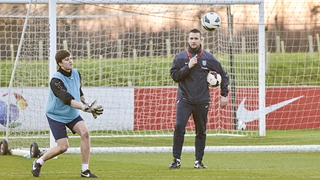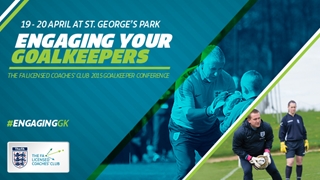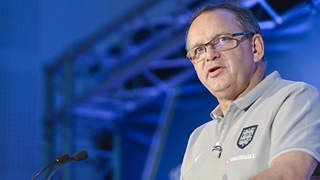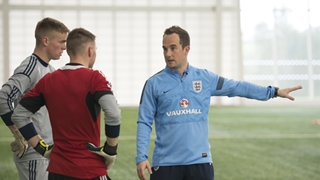
The scene is a familiar: a handful of goalkeepers working in the far corner of the pitch with a goalkeeper coach, whilst the outfield players sprawl across the available playing surface.
Whilst, Tim Dittmer, The FA’s lead FA National Goalkeeping Coach, stresses the importance of goalkeepers undertaking specific individual practice there is a push for goalkeepers to be included with the outfield players more often.
“There is a time and a place for goalkeepers to be isolated and work on position specific requirements. But being with the squad carries equal importance.
“More importantly is the goalkeeper is integrated into a squad practice. It is very easy to have them there but what conditions are applied in the game to ensure that the goalkeeper gets as much benefit from the practice as the outfield players,” explained Dittmer.
“This can be achieved through clever practice design and constraints which utilise different pitch shapes and sizes that create the pictures that the goalkeeper is going to experience in the game,” he added.
Dittmer was speaking in an interview with The Boot Room magazine and will return to this theme this weekend at The FA Goalkeeping Conference 2016 at St George’s Park.
The former Manchester City goalkeeping coach will deliver a session titled Decisions, Decisions, Decisions at the event and believes players’ decision-making can be improved by the constraints a coach puts on a practice.
“Clever practice design is important. Sessions and exercises which demand goalkeeper’s to make specific decisions over varying distances are really important.
“Then the coach’s role is to set the conditions and the challenge and help the players make decisions within that framework. If we’re afraid of putting the goalkeepers into that situation they’re never going to become comfortable making decisions. With the right environment and clever practice design we can improve that,” added Dittmer.
The FA’s Lead National Goalkeeper coach believes the raw goalkeeping talent in this country is there and believes a greater exposure to tactical decision-making will prove rewarding; his thoughts on distribution a case in point.
“We have to create an environment for them to express themselves and to be creative with their distribution. We don’t want our goalkeeper’s to be boring or one dimensional in their play. We want them to express their advantage of being that eleventh player.
“As a nation a lot of our goalkeepers have good technique and distribution skills, but when they put that into play tactically, in a unit or in a team, it can sometimes fall down,” explains Dittmer.
“We need goalkeepers who have the technical skills to deliver a full range of passes over all the different distances, but crucially the understanding of how the team are going to play, what the players’ movements are and how they can be the eleventh player in possession, “ he added.
The concept of the goalkeeper as the eleventh player is central to the England DNA vision for the future goalkeeper.
“The goalkeeper being part of the team, and not viewed in isolation, is the first and most important aspect.
“When we have been looking at the how the game will be played in the future and how we want our future England goalkeepers to play when we have the ball, we want the goalkeeper to be an additional outfield player – the eleventh player.
“Whether the goalkeeper is playing a part in retaining the ball in the first third, helping to progress the ball through the thirds and break lines, or whether the goalkeeper is contributing to the creating and scoring stage by setting up counter-attacks, utilising the goalkeeper as the eleventh player will be crucial,” explained Dittmer.







